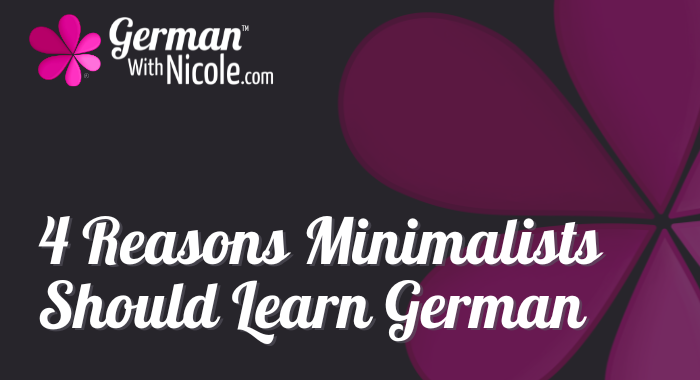4 Reasons Minimalists Should Learn German (And Why German is Easier than English!)

If you are already living with less or a minimum amount of possessions, or would like to, this philosophy works in your favor when learning German. Experience a language which is significantly more predictable than English; German is a great language to explore!
You'll also discover here how, in many ways, German is actually easier than English. I say this as a native English speaker, a near-native German speaker, and an instructor for both languages.
Of course both languages have their own unique quirks and things like prepositions are difficult no matter which language you're learning.
English has incredible capacities for expression and creativity that German can't begin to imitate.
At the same time, there are ways of expressing things in German through compound nouns that will never find their full equivalents in English. Schmerzensgeld, for example.
Here are four ways that German is easier than English and is a great fit for minimalists.
1. There are only 4 possible ways to say anything in German.
In German there are four cases: Nominative, Accusative, Dative and Genitive. We don't have these in English, so think of it like this: instead of having 8 or maybe 12 different serving dishes in your kitchen (like we have in English), you have 4. They're similar in size and shape, slightly different colors, but that's it.
You only have four possibilities. 1...2...3...4.
Done.
2. There are only 2 forms of the past tense: simple past (Präteritum) and present perfect (Perfekt).
A German student recently asked me to compare and contrast the present perfect in German and English and then he wanted to know when we would get to the grammar of constructions like the perfect continuous, e.g. "I have been going to a German class for three weeks."
Happily I explained that we wouldn't because that's not an official form of German. In German you can function and have fantastic communication with only the Perfekt and a bit of Präteritum for spoken communication and a lot of Präteritum for writing like stories and novels.
There are only two ways of talking about something in the past tense (for regular conversations and the majority of communication).
The present tense is its own tense and then there's the future, which only adds a verb if necessary. So there are fewer time issues to contend with.
Now consider all the other forms in English like:
- present continuous (also called the progressive): I am taking a German class.
- present tense: I go to that Indian restaurant all the time.
- present perfect: I have seen Das Leben der Anderen three times.
- past perfect continuous: I had been waiting for the bus for twenty minutes.
- and many more.
Makes your head hurt, doesn't it?
3. 1 adjective in German = 15 adjectives & adverbs in English
This isn't always true for translations, but this is a herrlich example:
| Deutsch | Englisch |
| herrlich |
delicious exquisite glorious gloriously magnificent admirable fine lovely marvelously splendid superb superbly wonderful splendiferous ripping |
4. German words are spelled how they sound. And they sound how they are spelled.
Watching a little kid learn to read in English makes me feel panic. I may be a native (American) English speaker, but the thought of little kids learning to read English strikes terror in my heart. The letter "a" has more pronunciations and combinations than I can count, there are weird combinations like "ei" and "ie" that don't follow rules, only general tendencies, and rightnowihavetostopbecausethismakesmefeelscaredforfuturegenerations.
*deep breath*
*another deep breath*
The beauty of German, especially for people with Dyslexia and other reading challenges, is its simplicity.
German letters make consistent sounds, so "b" makes the sound "b." The letter "a" makes the sound "ah." There are only a few vowel combinations that change that pattern, so the majority of the time you will be able to sound out a word in German just by knowing the alphabet.
Here a few German colors: braun. think bra u n. braun. rosa. ro sa. rosa. grün. grün. Regular words: Auto. a-u to. Auto.
English colors: purple. pur-pull. magenta. muh-djen-tuh. Regular words: auto: ah-toe. creature. cree-chur. creation. cree-ay-shun.
Categories
- A1 (70)
- A2 (55)
- B1 (47)
- B2 (24)
- C1 (22)
- Deutsch lernen (82)
- Einkaufen (15)
- Essen (12)
- Grammatik (24)
- Hören (14)
- Landeskunde und Kultur (50)
- Lesen (11)
- Musik (5)
- Nachrichten (4)
- Podcast (66)
- Pronunciation (3)
- Schreiben (4)
- Schwäbisch (4)
- Spiele und Spaß (Games and Fun) (12)
- Sprechen (12)
- Vokabeln (41)
- Video (13)
Would you like to hear about future German classes with Frau Warner?
With the E-Post, you'll receive information on German class registration and goings-on in German classes, all written by Frau Warner. You'll receive an email on Tuesdays, plus an extra email or two when class registration opens or there's something new.
If you use Gmail: please check your "promotions" folder.
0 comments
Leave a comment